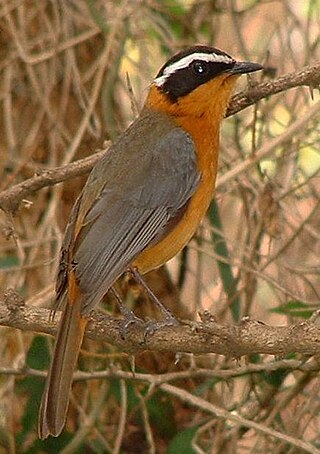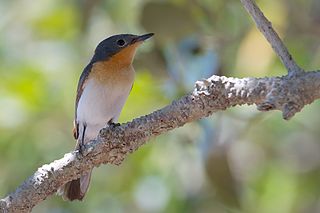
The African paradise flycatcher is a medium-sized passerine bird. The two central tail feathers of the male are extended into streamers that commonly are more than twice as long as the body. The female tail feathers are of moderate length and without streamers. The upper parts of the male body, wings, and tail are boldly coloured in chestnut or rusty shades, but the underparts and the head are variably grey to blue-gray, with the head of the mature male being darker, commonly glossy black with greenish highlights. The beak and other bare areas, including a wattle ring round the eye, match the colour of the surrounding feathers. The female coloration is similar, though not so showy and glossy and with the head paler.

The red-bellied paradise flycatcher, also known as the black-headed paradise flycatcher, is a medium-sized passerine bird of the family of monarch flycatchers. It is native to intra-tropical forests of Africa. The male bird is about 17 cm (7 in) long and has a black head, a mainly chestnut body, and a tail with streamers nearly twice as long as the body. The colouring is somewhat variable across the bird's range. Both females and juveniles lack the tail streamers and are a duller brown colour. It is closely related to the African paradise flycatcher, and the two can hybridise.

The paradise flycatchers (Terpsiphone) are a genus of birds in the family Monarchidae. The genus ranges across Africa and Asia, as well as a number of islands. A few species are migratory, but the majority are resident. The most telling characteristic of the genus is the long tail streamers of the males of many species. In addition to the long tails the males and females are sexually dimorphic and have rufous, black and white plumage.

The black paradise flycatcher, also known as the Japanese paradise flycatcher, is a medium-sized passerine bird native to southeastern Asia. It is a glossy black, chestnut and white bird, slightly smaller than either the Amur paradise flycatcher or Blyth's paradise flycatcher, but similar in appearance. Males have exceptionally long tails. Females are generally duller in appearance and have shorter tails.

The yellow-whiskered greenbul or yellow-whiskered bulbul is a species of the bulbul family of passerine birds. It is found in western and central Africa.

The yellow-bellied greenbul is a species of songbird in the bulbul family, Pycnonotidae. It is found in eastern, southern and west-central Africa. Its natural habitats are subtropical or tropical dry forests, subtropical or tropical moist lowland forests, and dry savanna.

The eastern nicator is a species of songbird in the family Nicatoridae. It is found in Eswatini, Kenya, Malawi, Mozambique, Somalia, South Africa, Tanzania, Zambia, and Zimbabwe. Its natural habitats are subtropical or tropical dry forests, dry savanna, and subtropical or tropical moist shrubland. It occurs south to around Mtunzini in northern KwaZulu-Natal, South Africa, and is regularly reported from lowland areas north through to east Africa, including inland areas along the Zambezi River.

Cabanis's greenbul, also known as Cabanis's bulbul, is a species of songbird in the bulbul family, Pycnonotidae. It is found in east-central and south-central Africa. Its natural habitats are subtropical or tropical dry forest, subtropical or tropical moist lowland forest, subtropical or tropical moist montane forest, and subtropical or tropical moist shrubland.

The yellow-streaked greenbul or yellow-streaked bulbul is a species of songbird in the bulbul family, Pycnonotidae. It is found in eastern and south-eastern Africa. Its natural habitats are subtropical or tropical moist lowland forest and subtropical or tropical moist montane forest.

The terrestrial brownbul is a species of songbird in the bulbul family, Pycnonotidae. It is found in eastern and south-eastern Africa. Its natural habitats are subtropical or tropical dry forest, subtropical or tropical moist lowland forest, and subtropical or tropical moist shrubland.

The white-browed robin-chat, also known as Heuglin's robin, is a species of bird in the family Muscicapidae. Found in east, central and southern Africa, its natural habitats include riverine forest and thickets, and it is also found near humans. The IUCN classifies it as a least-concern species.
The short-crested monarch is a species of bird in the family Monarchidae. It is endemic to the Philippines. It is found in tropical moist lowland forest. It is threatened by habitat loss.

The golden monarch is a species of passerine bird in the family Monarchidae found in New Guinea. Its natural habitats are subtropical or tropical moist lowland forests and subtropical or tropical moist montane forest. The golden monarch displays marked sexual dimorphism, the male a striking golden colour with black mask, wings and tail, the female a golden or golden-olive colour. Both bear a characteristic 'teardrop' white pattern below the eye.

The black-winged monarch is a species of bird in the family Monarchidae. It is found in Australia and on New Guinea. Its natural habitats are subtropical or tropical moist lowland forests and subtropical or tropical moist montane forests.

The ashy flycatcher is a species of bird in the Old World flycatcher family Muscicapidae. It is found throughout sub-Saharan Africa, excluding the drier areas of South Africa, Botswana, and Namibia, where it inhabits subtropical or tropical dry forest, subtropical or tropical moist lowland forest, and savanna. It has a disputed generic placement, with different authorities variously putting it in Muscicapa, Fraseria, or other genera. Ashy flycatchers are mostly grey in colour, with pale grey or white underparts, and display no sexual dimorphism.

The shining flycatcher is a species of bird in the family Monarchidae. It is found in northern Australia, and from the Moluccas to the Bismarck Archipelago. Its natural habitats are subtropical or tropical moist lowland forest and subtropical or tropical mangrove forest.

The Moluccan flycatcher or dark-grey flycatcher is a species of bird in the family Monarchidae. It is endemic to Indonesia.

The broad-billed flycatcher is a species of bird in the family Monarchidae. It is found in northern Australia, the Lesser Sunda Islands and southern New Guinea. Its natural habitats are subtropical or tropical moist lowland forest, subtropical or tropical mangrove forest, and subtropical or tropical moist montane forest.

The blue-headed crested flycatcher is a species of bird in the family Monarchidae, native to the African tropical forest.

The spotted ground thrush is a species of bird in the family Turdidae. It is found in the Democratic Republic of the Congo, Kenya, Malawi, South Africa, Sudan, Tanzania, and possibly Mozambique.





















